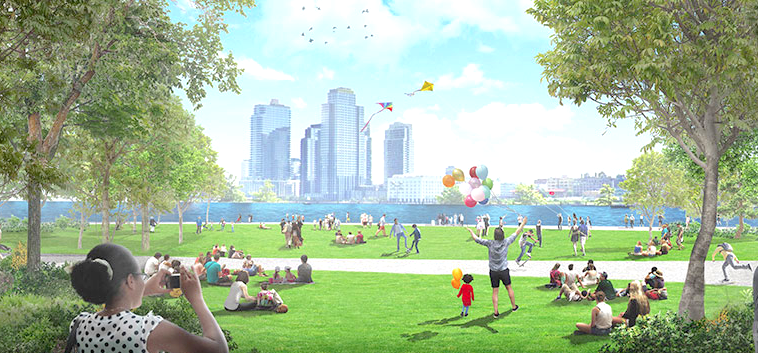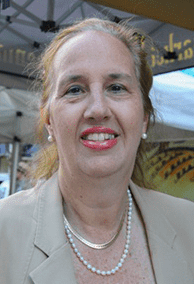The Manhattan Borough President is demanding that the city provide guarantees of access to parks and recreation and interim bike and pedestrian routes as it moves ahead with a controversial project to raise the coastline of the waterfront along that East River in lower Manhattan.
Gale Brewer wrote Monday to the Mayor’s Office of Recovery and Resiliency and the departments of Planning, Parks, Design and Construction and Transportation urging them to wait another two months before moving ahead on the East Side Coastal Resiliency project.
Brewer and the affected communities generally support the purpose of the project, which will protect the waterfront from potential storm surges related to climate change, while also modernizing park facilities along a three-mile stretch from Montgomery to East 25th streets. But they say the plan runs roughshod over the communities by denying residents access to parkland, ball fields and their well-traveled riverside bike path for almost four years during construction — all for the sake of saving the FDR Drive.
“Personally, I can tell you that I and my family use the bikeway through East River Park almost every day to get to work, school, and Little League games,” said Jeremy Sherber, a leader of the Grand Street Democrats, one of the community group asking the city to revisit the project. “It's a safe way for my 12-year-old son to commute on his own for baseball practice and to visit friends. Getting rid of this part of the greenway for years and asking cyclists to use First Avenue instead is misguided and probably runs afoul of New York State's regulations prohibiting alienation of parkland.”
The city hopes to move ahead quickly in order to access federal funds for the $1.45-billion project, some of which may have deadlines. It describes the project in glowing terms, as “an integrated coastal-protection system that will reduce the risk of flooding and facilitate access to the waterfront, creating improved public spaces and enhanced natural areas.” The construction, which is slated to run from 2020 to 2023, will “strengthen 2.4 miles of urban coastline against floods and rising sea levels” while bringing a “ferry landing, cultural facilities, and kayaking amenities to create a vibrant waterfront" at Stuyvesant Cove Park, according to promotional materials at the city's website.
Brewer agrees with the project's environmental necessity. But she asked officials to slow-walk the initiative because of what she called “unaddressed” concerns about conditions during the construction. Besides worrying that the city has not made adequate plans for emergency management during storm surges, residents want the administration to conduct “a robust traffic study for adequate and safe, interim bike and pedestrian routes,” she wrote.
“This is an important project that shouldn’t be rushed,” Brewer told Streetsblog. “I want to ensure that there is enough time in the review process to allow community members to understand the plan and how it will affect their communities.”
Also, the Grand Street Democrats want the city to “convene an independent panel of engineering specialists to review the City’s current plan and proposed alternatives” such as a recommendation to extend the East River Park over the FDR Drive, according to a resolution the group passed in May. Expanding pedestrian access to the waterfront — and burying the hated highway — has been a community goal for decades.
“Expert panels have either reviewed or been proposed for large-scale construction projects on the L train, BQE, and East Side Connector; the Lower East Side deserves the same consideration,” the resolution argues.
Local activists thanked Brewer for asking for a stay of the project.
“We applaud Gale Brewer’s request to ask for a 60-day delay for the City Planning Commission hearing, since there are still many unanswered questions about the ESCR plan,” said Christine Datz-Romero, executive director of the Lower East Side Ecology Center. “We hope in this time frame an independent panel of experts can be convened to evaluate the ESCR plan to ensure it is the best possible plan to protect our community from storms and flooding caused by climate change.”
The East River Alliance, a consortium of local activists who oppose aspects of the plan, will hold its general meeting on Wednesday night at 6:30 at Green Oasis Community Garden, located at 372 E. 8th St, Manhattan, between Avenue C & D.







